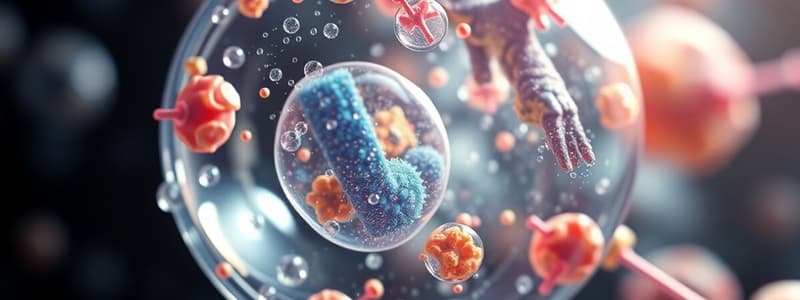Podcast
Questions and Answers
What is the primary function of mitosis in multicellular organisms?
What is the primary function of mitosis in multicellular organisms?
- To transport substances across cell membranes
- To facilitate the function of specialized cells
- To duplicate chromosomes and create identical daughter cells (correct)
- To enhance diffusion through specialized structures
Which of the following correctly describes osmosis?
Which of the following correctly describes osmosis?
- The active transport of glucose into animal cells
- The movement of nutrients against a concentration gradient
- The passive movement of water across a semi-permeable membrane (correct)
- The uptake of mineral ions through protein pumps
What role do specialized exchange surfaces play in organisms?
What role do specialized exchange surfaces play in organisms?
- They facilitate the rapid exchange of materials (correct)
- They store genetic materials for cell division
- They produce energy for cellular processes
- They create barriers to protect cells from toxins
What is required for active transport to occur in cells?
What is required for active transport to occur in cells?
Which statement about the function of nerve and muscle cells is correct?
Which statement about the function of nerve and muscle cells is correct?
Flashcards
Mitosis
Mitosis
The process where a parent cell's chromosomes duplicate and the nucleus splits into two identical daughter cells, each receiving an equal share of the genetic information. This is followed by division of the cytoplasm, resulting in two new smaller cells.
Specialized Exchange Surfaces
Specialized Exchange Surfaces
Structures in animals and plants designed to maximize the rate of material exchange. They have a large surface area relative to their volume, facilitating rapid diffusion.
Active Transport
Active Transport
The movement of substances across a cell membrane against their concentration gradient. This process requires energy from respiration and utilizes protein pumps embedded in the membrane.
Osmosis
Osmosis
Signup and view all the flashcards
What are cell types specialized for?
What are cell types specialized for?
Signup and view all the flashcards
Study Notes
Active Transport
- Active transport moves substances against the concentration gradient
- Energy (from respiration) is used to move substances
- Substances are pumped in or out of cells
- Involved in nutrient absorption (e.g., in the small intestine) and ion uptake by plant roots.
Osmosis
- Osmosis is the movement of water from a dilute solution to a concentrated solution
- Across a partially permeable membrane
- Water moves to equalize concentration
- Important in moving water between plant cells and roots.
Specialized Exchange Surfaces
- Some parts of organisms have specialized structures for exchanging materials
- Large surface area in proportion to their volume (e.g., alveoli in lungs, villi in small intestine)
- Maximizes the rate of diffusion
- Allows efficient exchange of oxygen, carbon dioxide, and nutrients.
Cell Division and Differentiation
- Multicellular organisms start as a single fertilised egg cell (zygote)
- Zygote divides repeatedly (mitosis) to form millions of cells in adult body
- Mitosis ensures genetic information is shared equally between new cells
- Cell differentiation creates specialised cells with specific functions
- Cells are adapted to different roles (e.g., nerve cells, muscle cells, etc.)
Studying That Suits You
Use AI to generate personalized quizzes and flashcards to suit your learning preferences.




